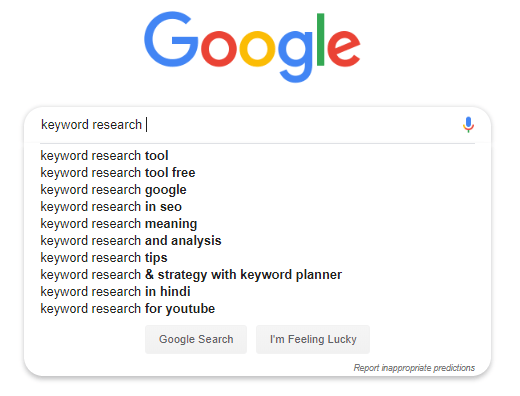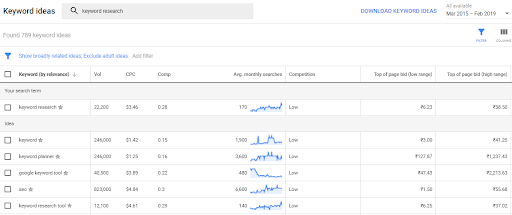How to do keyword research? An Ultimate Guide
Is keyword research still important?
Yes, Keyword research is the main part of digital marketing especially for Search Engine Optimization, Search Engine Marketing, Content Writing, and PPC ads. Without keyword research, the SEO analysts will not start their project. In most cases, this is the first and foremost task that has to perform at the beginning of the SEO project.
Lets us know how to do that? but, before jump into the process of the keyword research lets looks at what is Keyword and Keyword research?
What is Keyword?
A keyword is a term, phrase, query or a search that people used to reach a particular service, product, information or a website through search engines. Search engines will fetch the results based on the Keyword that searcher typed or asked. In most cases, search queries fall under 3 types:
- Navigational search query
- Informational search query
- Transactional search query

Navigational search query:
A search query entered to find a particular website or web page. For example, a searcher might enter “Facebook” into Google’s search bar to find the Facebook site rather than entering the URL into a browser’s navigation bar.
Informational search query:
A search query entered to find a piece of information or answer for a question. For example, How to, what is, when to etc., these are the queries which come under informational search query.
Transactional search query:
A search query entered to make a purchase, order or buy something or complete transactions. In most cases, the transactional queries come with an exact brand and product name. For example, VIVO V5 mobile phones offer, Flipkart sale comes under a transactional search query.
What is Keyword Research?
The process of identifying the best possible term, phrase, query or a search that is going to be used by the searcher to drive better results is called keyword research.
Doing the right keyword research will save your time & effort which will also help to easily rank on the Search Engine Results Pages (SERP) results, be ahead of competitors, reach the perfect set of target audience sooner and lot more.
When to do keyword research?
The following scenario may compel you to do keyword research while,
- Writing for the blog content
- Renovation of old website/landing pages
- When selling your products online
- When you do business through online medium
- Framing SEO Strategy
- Running ads on Google, Yahoo & Bing
- To do local SEO Optimization
- To run social media ad campaigns
Top 3 Criteria for choosing the right Keyword

- Relevancy – How well the searching term is relevant to your business, product or services.
- Search Volume – How people are exactly searching for it, you need to check the search volume for both your country and global.
- Competition – How toughest the competition is for a particular term among competitors.
Here’s how you to do keywords research:
Here’s are the top 6 keywords research strategy to go with. First, segregate the overall keywords into the following parts as:
- Longtail Keywords
- Niche Keywords
- Hidden/Untapped Keywords
- Low Competition Keywords
- Question Keywords
- LSI/Semantic and Synonym Keywords
1. Longtail Keywords
What is Long tail keywords?
A phrase or a term which is come along with the main keyword is called long tail keyword. Usually, the count of longtail keyword will be more than 3 words.
For example, Keyword research and analysis & Keyword research free tools.
Benefits of choosing longtail keywords?
- These keywords are easy to rank when compare to the main keywords.
- Better-targeted audience.
- High chances for click-through rate.
- Gain more visibility in Google search engine.
Tools to identify Long Tail Keywords:
You can find long tail keywords from Google autosuggest and keywordtool.io both these tools are available as free so anybody can use.
- Google Autosuggest

Since we are doing optimization on Google platform will first focus on Google autosuggest tool. Here’s how Google autosuggest will work you just type in the main keywords on the search bar and see how many long tail keywords that Google has suggested to you these are the high potential keywords for your analyses. It shows the exact long tail keywords that are already searched by target searchers.
- Keywordtool.io

The advantage of this tool is you can get the appropriate keywords for all type of platform like Google, Youtube, Bing, Amazon, Bing, etc., Since it is a free tool we cannot able to see the competition, Trend, CPC & competition but, you can export the keywords in bulk and sort out the relevant keyword and use it for further analysis. You can use the Keyword Tool for free, even without signup an account.
2. Niche Keywords

With this Google keyword planner, you can find out our own solid and important keywords. This tool is largely preferred by most people for keyword research and analysis. It is more suitable for CPC Campaigns like search ads, display ads and video ads. You can do keyword research in 2 ways on these tools.
- By directly inputting the page URL and it will fetch the keywords from the particular URL or
- Directly typing the main keyword and try to find out as many relevant keywords related to that focused keyword.
3. Hidden/Untapped Keywords
Identify the hidden and untapped keywords from forums and communities like Reddit, Quora, etc. The questions that arise in Forums and communities are like what, why and how related search terms.
Look what question people are more interested in asking which may be missed out in other tools like google keyword planner and keywordtool.io
Add the untapped/hidden keyword as a part of keyword research. Because huge no. of people discussing the topics so, there is a high chance to be as a potential keyword. Keep an eye on communities and forums to get untapped keywords.
4. Low Competition Keywords

To rank easily on the search engine then you have to opt for fewer competition keywords. Competing with fewer competition keywords will give the expected results sooner than other main keywords. You can find low competitive keywords from the below KWFinder tool
This tool will tell you how much a particular keyword is tough to rank and also gives a top ten competitors for that particular search term in the search results. You can get data like similar keywords, trend, Search volume, PPC from the given tool so, it is much useful for keyword research.
5. Question Keywords
Searchers are using questions related term on the Google search that’s why we call it as a Search query. They mostly use what, why, how and when question. To find out those keywords we have one excellent tool. Here’s what it is:
Answerthepublic


Get the question-related keywords from the Answerthepublic tool at free of cost and start your keyword analysis. Keywords suggested from tools will help you in future for writing blog content, Landing page content to boost your rankings.
One exclusive information from Fresh Digi Hub Tip Box is – If you have keyword everywhere extension tool you can also able to check the search volume, CPC and competition for the questions in answerthepublic itself.
6. LSI/Semantic and Synonym Keywords:
Try to include the LSI and synonym keywords as part of your keyword research.
What is LSI?
Is a question now, Latent Semantic Index keyword is a term or phrase related to the main keywords.
In order to give the best relevant results for the searcher, Google will look at what other LSI related keywords that are presented in the search queries and on the website. If it is there then, search engines take priority to rank first in the search results.
For example, If your target keyword is “Keyword research” then LSI could be:

Synonym Keywords:
The synonym keyword is a concept of driving the same meaning from different phrases. It helps to avoid keyword density. If the main keyword overused then you can add the synonym of your main keyword.
Check your keyword density and start to use synonym keywords to reduce the overdo. Get the synonyms terms from the Thesaurus tool.

For example, If your main keyword is “Movie” then your synonym keyword could be Cinema, Film & Picture, etc.,
Conclusion:
Hope now you have understood what, why and how to do keyword research. Also, try the above extraordinary tools which will help you to save your time in the keyword research. We are sure that the above tips will definitely help you to improve your digital marketing results. Let us know what you expected from the topic and mention the topics/heading that could be covered under this blog write it on your comment section.
Fresh Digi Hub provides Digital marketing services in Chennai, if you required our services or guidance, don’t hesitate to call +91 8940732055 or email.
